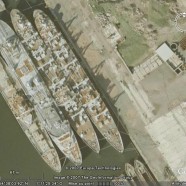Oil slick Queen demolished in Bangladesh ?
According to informations coming from Chittagong, three container ships managed by German companies have just been put on sale on the demolition market. These three vessels are the joint property of KGAL, based in Germany, the largest European maritime leasing* company, and subsidiary of Allianz and Dresdner Bank, and of V Ships Germany, subsidiary of V Ships Monaco, the largest manager of commerce vessels in the world.
The Ankara, the Maersk Brisbane, and the Maersk Barcelona (Maersk is solely the charterer) were built in Germany in 1975-1976 and are motorized by vapor turbines whose installation requires large quantities of asbestos. These three sisterships have a lightweight of 15,000 t each.
Already, V Ships and KGAL have made it known that they will assign the container ships destined for demolition to the highest bidder, that is to say to Bangladeshi demolition shipyards, at around $700 per ton while the average price in India is around $550 per ton.
Considering social, sanitary, and disastrous environmental conditions in Bangladesh, Robin des Bois asks these European companies to either proceed with the preliminary removal of asbestos, to choose the best Asian demolition shipyards within the framework of a specific partnership, or even to demolish and recycle these vessels in Europe. A letter was sent to them in this respect.
The three container ships are frequently in European waters and one of them, the Maersk Barcelona, appeared on the Atlantic front in September 2005, near the island of Sein, off Brittany, by a record “61 km (38 miles) oil slick” that was sanctioned by an $800,000 fine. The inspectors from the vessel security center had revealed a lack of care for the oily waters treatment installation.
Paranoia and Ghost Fleet
Since November 2003 four American vessels have been waiting to be demolished in the English port of Hartlepool. Following the legal harassment by the organisation Friends of the Earth, the dismantling is constantly delayed. From the beginning, Robin des Bois a non-governmental French organisation states that the British shipyard ABLE U.K in Hartlepool should be given permission to implement their contract to dismantle the retired US Navy freight ships. These ghost ships were towed to Hartlepool under an agreement between The United States and the British authorities. (See Robin des Bois press releases. “Un espoir pour les navires en fin de vie”, 8th December 2003 and “Another way of looking at the Clemenceau” 30th December 2005).
Another way of looking at the Clémenceau
The “Marine Nationale” French Navy is the first European ship owner to have started an asbestos cleaning process prior to the ship being scrapped. In 2005 in Europe dozens of ships, tankers, liners, chemical cargo boats left Europe to be dismantled in Asia and in Turkey without any prior treatment.
The work which was carried out on the Clémenceau represents the first step towards better working conditions for shipbreaking. At the end of her working life the Clémenceau contained about 1.000 tons of asbestos. Today she still holds about 100 tons. The asbestos was disposed of in officially licensed waste disposal sites.
In Europe today there is no shipbreaking yard or at least a grounding beach available to dismantle large ships. The only work site in Europe which claims to have the capacity and to be equipped is the British Port, Hartlepool. The old US Navy freight ships bound for scrapping towed to this site provoked an uproar from the environmentalists. Notwithstanding these positions, Robin des Bois has since seen a hope for ships at the end of their life. In Amsterdam an experimental work site for the dismantling of medium sized ships is being tested. France has done nothing.
The asbestos pre-cleaning process of the Clémenceau is positive. It is essential not to underestimate its importance, on the contrary, we have to stress that all the European ship owners should do the like wise.
There is nowhere available in France to completely dismantle nor to thoroughly clean the Clémenceau, in the short term.
If there is no solution found to recycle the Clémenceau, it might be sunk in the Mediterranean Sea for military purposes. This is the worst case scenario, which some nostalgics might dream of.









